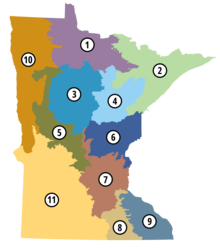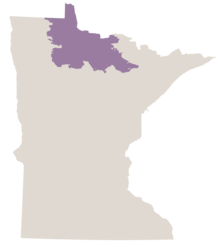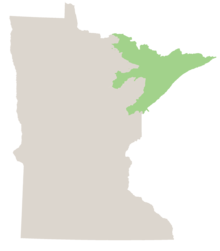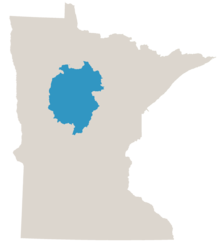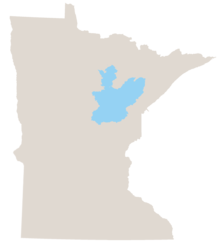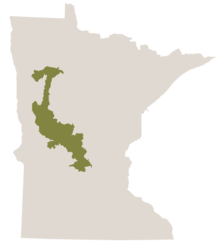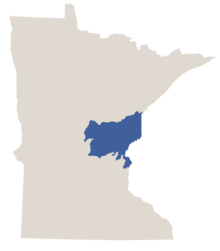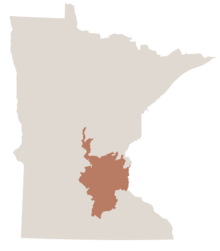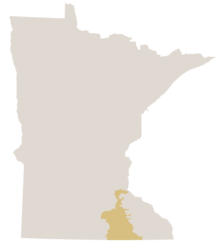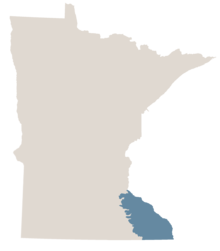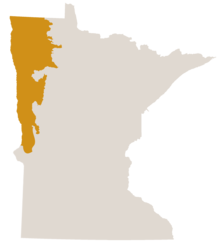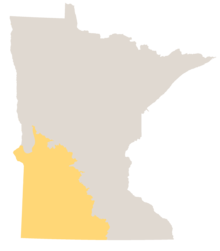Quick facts
- Climate change will cause stress on the trees, plants and animals in Minnesota’s forests.
- Our lists of climate-ready trees and plants can help landowners make informed planting decisions to help whole forest ecosystems adapt.
Trees live a long time, and we want to plant trees that will thrive 50 to 100 years from now. Using climate projections for each region in our state, our recommendation lists offer options for native tree species predicted to be resilient to the changing climate. We hope these recommendations will help landowners make informed decisions that will help whole forest ecosystems adapt.
You may notice that some of Minnesota’s iconic Northwoods species are not on the recommendation lists. Some species are threatened by critical forest health concerns (like black ash) or are rated as having a poor response to climate change in some regions (such as white spruce). These species still hold significant ecological and cultural value, and we hope landowners will continue to care for them. You may need to consider managing them in smaller, protected areas rather than as large stands. Learn how creating refugia in your woodlands can help protect vulnerable species.
We’ve also included lists of native plants we recommend for rewilding the forest understory. These plants are integral to the forest ecosystem, providing habitat and food for insects, birds, and small mammals. While many of the plants on these lists are available at nurseries that specialize in native plants, you may also be able to find them already growing in your woods. Consider promoting the biodiversity of these understory plants in addition to tree species.
Recommended trees and plants for your region
How to use the lists
Minnesota is an ecologically diverse state. For these lists, the state is divided into 11 regions, each with characteristic soils, precipitation patterns, topography and natural vegetation.
Choose the section below that aligns with your location on the numbered map to find tree and plant recommendations specific to your region.
The area of northern Minnesota known as the Agassiz Lowlands and Littlefork-Vermilion Uplands subsections includes all or parts of Beltrami, Clearwater, Itasca, Koochiching, Lake of the Woods, Marshall, Pennington, Roseau, and St. Louis counties.
This region is shaped by the deposits from Glacial Lake Agassiz during the last glacial period. These clay-rich deposits contributed to the widespread formation of wetlands, such as lakes, bogs, and fens across the northern part of Minnesota.
The Arrowhead region of Minnesota, known as the Northern Superior Uplands subsection, includes all or parts of Carlton, Cook, Itasca, Koochiching, Lake, and St. Louis counties.
This area is characterized by bedrock terrain peppered with many lakes and thin deposits of coarse loamy soil. The region receives more of its precipitation as snow than any section in the state, has the longest period of snow cover, and has the shortest growing season.
Forests with red and white pine were widespread in the past, mixed with aspen, paper birch, spruce, and balsam fir. Much of the pine was cut in the late 1800s and early 1900s, leaving forests dominated mostly by aspen and paper birch. Jack pine forests are present on droughty ridges and bedrock exposures, as well as on local sandy outwash deposits. The highlands along Lake Superior have a local climate moderated by the lake that favors forests dominated by sugar maple with some white pine, yellow birch and northern white cedar.
Trees
Plants
The Central Lakes region of Minnesota is known by ecologists as the Chippewa Plains and Pine Moraine-Outwash Plain subsections. This area includes all or parts of Aitkin, Becker, Beltrami, Cass, Clearwater, Crow Wing, Hubbard, Itasca, Koochiching, Mahnomen, Morrison, Otter Tail, Polk, Todd, and Wadena counties.
Here you’ll find complex surface geology, formed over many episodes of glaciation. Mesic forests of sugar maple, basswood, paper birch, aspen, and northern red oak are widespread and occur mostly on moraines (mounds of rocky sediment deposited by glaciers) or till plains. Historically, forests and woodlands of jack pine and red pine were very common on the sandy outwash plains formed by glacial meltwater.
Sandy and gravelly deposits that cap many of the major moraines provide habitat for mixed forests of pine and boreal hardwood species such as quaking aspen and paper birch. Sedge meadows and alder and willow swamps occur along the slow-moving streams draining the flat lake plains and along the Mississippi and Leech Lake rivers.
Trees
Plants
The area of north-central Minnesota known as the St. Louis Moraines and Tamarack Lowlands subsections includes all or parts of Aitkin, Carlton, Cass, Crow Wing, Itasca, and St. Louis counties.
These areas have been shaped by the glacial history of Minnesota, just like the rest of the state. Rolling hills in this area are caused by glacial deposits called moraines. Lowlands cover a large part of this region as a result of ancient lake plains, where glaciers previously melted and left behind flat topography with lacustrine (lake drainage) deposits. The Sax-Zim Bog is a great example of this landform.
The low-lying topography and wet conditions led to the accumulation of slowly decomposing vegetative material called peat on top of those lacustrine deposits. These conditions created the large areas of bogs that we see today, characterized by tree species such as black spruce and tamarack, but also a great diversity of bird species. The Sax-Zim Bog is a very popular destination for Minnesota’s birders.
Trees
Plants
The western edge of Minnesota’s forest biome is known as the Hardwood Hills, and it includes all or parts of Becker, Clearwater, Douglas, Kandiyohi, Mahnomen, Meeker, Morrison, Otter Tail, Polk, Stearns, Todd and Wright counties.
The Hardwood Hills region is characterized by steep slopes, high hills and lakes, and acidic to alkaline, loamy soils. Pre-settlement vegetation ranged from tallgrass prairie to aspen, oak savannas, maple, basswood and other hardwood trees in fire-protected areas.
This list includes sugar maple, which is the primary producer of maple syrup, and bur oak, which is often found in many savanna and forest edge communities. This list also includes Dutch elm disease-resistant cultivars of American elm. The idea of reintroducing this iconic American tree to our forests is exciting! And as a bonus, it often does well in some of the same habitats as ash, which is not recommended because of emerald ash borer.
The list of recommended plants is also really interesting and contains many wild edibles, including hog peanut, American hazelnut, black cherry, chokecherry, smooth sumac and wild grape.
The area of east-central Minnesota known as the Mille Lacs Uplands and Glacial Lake Superior Plain subsections includes all or parts of Aitkin, Benton, Carlton, Chisago, Crow Wing, Isanti, Kanabec, Mille Lacs, Morrison, Pine, and Sherburne counties.
The soils of the Mille Lacs Uplands are coarse-textured near the southwestern edge of the region but become increasingly clayey to the northeast. The forests in areas of coarser drift (clay, silt, sand, gravel, and boulders deposited by glaciers) are dominated by northern red oak, while areas of clayey soil have forests of sugar maple, aspen, and birch.
Sandy terraces along the St. Croix River and small sand plains in other parts of the section have fire-dependent woodlands or forests of jack pine, bur oak, northern pin oak, and aspen. Fire-dependent pine, oak, and aspen forests are also present occasionally with mesic hardwood forests on coarse till and drumlins (teardrop-shaped hills of rock, sand, and gravel). Peatlands and other wetland communities are present mostly as inclusions within the broad areas of hardwood forest.
The small region near Duluth called the Glacial Lake Superior Plain is composed mostly of clayey sediments. The landscape is highly dissected by the Nemadji River and its tributaries, characterized by steep-sided ravines. The ravine slopes support wet-mesic forests of aspen and paper birch mixed with conifers such as white spruce, balsam fir, northern white cedar, and white pine; and mesic forests of sugar maple, basswood, and paper birch. High areas between the ravines represent flat, clayey, poorly drained remnants of the glacial lake bed. These sites most commonly have wet forests dominated by black ash mixed with northern white cedar and yellow birch.
Trees
Plants
The Twin Cities greater metropolitan area is known to ecologists as the Anoka Sand Plain, Big Woods, and St. Paul-Baldwin Plains and Moraines subsections. This region covers all or parts of Anoka, Benton, Blue Earth, Carver, Cass, Chisago, Crow Wing, Dakota, Hennepin, Isanti, Le Sueur, McLeod, Meeker, Mille Lacs, Morrison, Nicollet, Ramsey, Rice, Scott, Sherburne, Sibley, Stearns, Waseca, Washington and Wright counties.
The Anoka Sand Plain is characterized by flat, sandy lake plains and terraces along the Mississippi River. Most of the soils are sandy and dry, but there are some poorly drained organic soils. Originally this area was filled with oak barrens and openings, with some jack pine along the northern edge.
Topography in the Big Woods is gently to moderately rolling. Soils were formed in thick deposits of gray limey glacial till left by the retreat of the ice sheets over 12,000 years ago. Red oak, sugar maple, basswood and American elm were most common in this mostly forested region.
The rolling to steep slopes of the St. Paul-Baldwin Plains and Moraines gently level on the outwash plain, with soils ranging from clay loam to sand. This area was once a mosaic of tall grass prairie, savannahs and maple-basswood forests prior to settlement.
The trees recommended for the future forests of this area are all commercially available, but finding some of the native plants might be harder. In these cases, rewilding the understory might mean letting the chokecherry grow, rather than actually planting it.
The Oak Savanna subsection includes all or parts of Dakota, Dodge, Fillmore, Freeborn, Goodhue, Le Sueur, Mower, Olmsted, Rice, Steele and Waseca counties.
Much of this area is a rolling plain of windblown, silt-covered ridges over sandstone and carbonate bedrock and till. Soils range from wet to well-drained, formed under prairie or forest conditions. Original vegetation included bur oaks, maples, basswood and prairie tall grasses.
Because the Oak Savanna region is in the far southern region of Minnesota, many trees on this recommended list are native further south but are predicted to do well in Minnesota’s future climate. This list includes native sugar maple — the primary producer of maple syrup. Sassafras, a potential candidate for climate migration into the area, has three unique leaf shapes and lovely fall colors.
The list of recommended plants includes many spring ephemerals including Dutchman’s breeches and edible wild leek, and several edible shrubs like American hazelnut and low juneberry. The rich and diverse understory native to this region is well-positioned for Minnesota’s future climate if invasive species can be adequately managed.
Trees
Plants
The extreme southeast region of Minnesota commonly referred to as the Driftless Area, is home to the Rochester Plateau and Blufflands subsections. This region includes all or parts of Dakota, Dodge, Fillmore, Goodhue, Houston, Mower, Olmsted, Rice, Wabasha, Washington, and Winona counties.
A rolling, high plateau of windblown silt over glacial till in the west and bedrock in the east, the soil depth in this region generally decreases from west to east. Plant communities were historically dominated by oak forests, maple-basswood forests, riparian forests, and tallgrass prairies and oak savannas in the drier areas. The eastern blufflands were extensively eroded by rivers and streams. Broad ridge tops, steep coulees, and deep valleys were dominated by oak, shagbark hickory-basswood forests on moist slopes, oak-basswood-black walnut forests in the valleys and prairies on the ridge tops and dry valleys.
You'll notice that many trees on this list are newcomers to Minnesota. As our climate becomes warmer and wetter, trees in states to our south and east are able to shift northward and should feel right at home in this far southeastern region of the state. One example is the lovely tulip tree, Liriodendron tulipifera. The list of recommended plants includes many spring ephemerals and deer-resistant understory plants.
The Red River Prairie and Aspen Parklands subsections cover all or parts of Becker, Beltrami, Big Stone, Clay, Clearwater, Grant, Kittson, Mahnomen, Marshall, Norman, Otter Tail, Pennington, Polk, Red Lake, Roseau, Stevens, Traverse and Wilkin counties.
Bounded to the west by the Red River and extending eastward to the limits of continuous tall grass prairie presettlement vegetation, much of the Red River Prairie is a large lake plain formed by the Glacial Lake Agassiz. Soils range from clays to sandy/gravelly beach ridges, may be poorly to moderately well-drained, and are often very alkaline. Originally, the area was vegetated by bluestems, Indian grass, and other grasses. Narrow, forested floodplains were common along larger streams and rivers. Broader zones of woodland were common along the fire shadows of streams.
The Aspen Parklands is a low, level plain that is a transition zone between conifer peat bogs to the east and tallgrass prairie to the west. Soils range from loamy to gravelly, poorly- to well-drained, and acidic to very alkaline. Originally, the area was vegetated by various types of prairies, aspen, silver maple, elm, cottonwood and ash.
Many trees on the recommendation list are native further south or southwest but are predicted to do well in this region’s future climate. This list of trees includes many familiar to southern Minnesota, including walnut and red mulberry.
This prairie-rich region has a much lengthier list of understory plants and includes many commonly sold shrubs such as Juneberries, gray and red-osier dogwood, highbush cranberry and beaked hazelnut, plus several goldenrods, grasses and sedges.
Trees
Plants
The Minnesota River Prairie, Coteau Moraines, and Inner Coteau ecological subsections cover a vast swath of southwestern Minnesota and account for nearly a quarter of the land area in the state. This region contains all or portions of Big Stone, Blue Earth, Brown, Chippewa, Cottonwood, Faribault, Freeborn, Grant, Jackson, Kandiyohi, Lac Qui Parle, Lincoln, Lyon, Martin, McLeod, Meeker, Murray, Nicollet, Nobles, Pipestone, Redwood, Renville, Rock, Sibley, Stevens, Swift, Waseca, Watonwan, and Yellow Medicine counties.
The Minnesota River Prairie is a region of level to gently rolling moraines, with well- to moderately well-drained loamy soils. A few soils are clayey, some sandy and gravelly. A very drying environment for woody plants. Original vegetation was prairie grasses and riparian forests of silver maple, cottonwood, elm and willow.
Soils in the Inner Coteau are well-drained and consist of windblown silt with occasional bedrock outcrops. Plant communities were dominated by prairies and occasional riparian forests.
The far southwestern corner of Minnesota is home to the Coteau Moraines. Here, gently rolling to hilly land with windblown silt soils covers loamy, well-drained glacial material high in lime. Plant communities were dominated by tall grass prairies with occasional forests near streams.
Unlike their forest biome counterparts to the east, this prairie-rich region is not heavily forested. That doesn’t mean that there aren’t any woodlands in this area–they are just smaller and less common. The list of recommended trees is fairly short but includes iconic bur oak and several edible trees, including potential climate migrants pecan and sugarberry.
The much lengthier list of recommended understory plants for this region includes many prairie plants such as asters, sunflowers and the iconic big bluestem.
Trees
Plants
Reviewed in 2024


